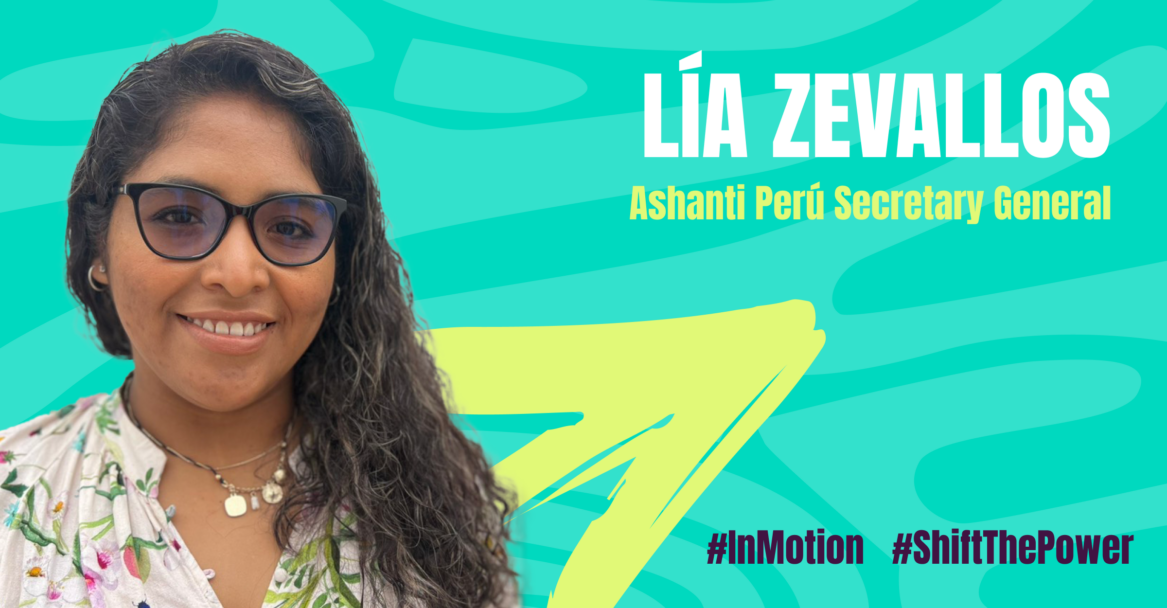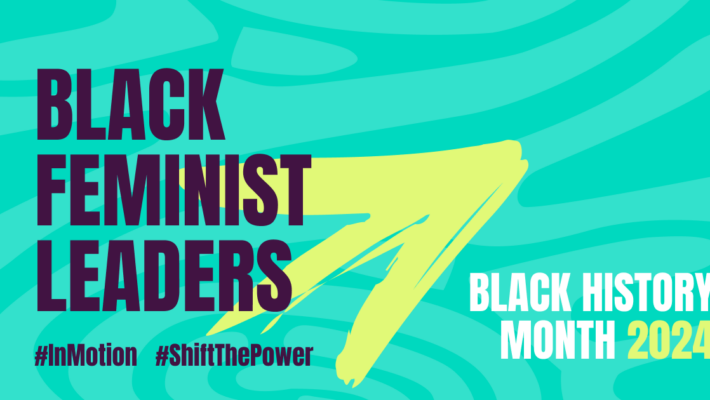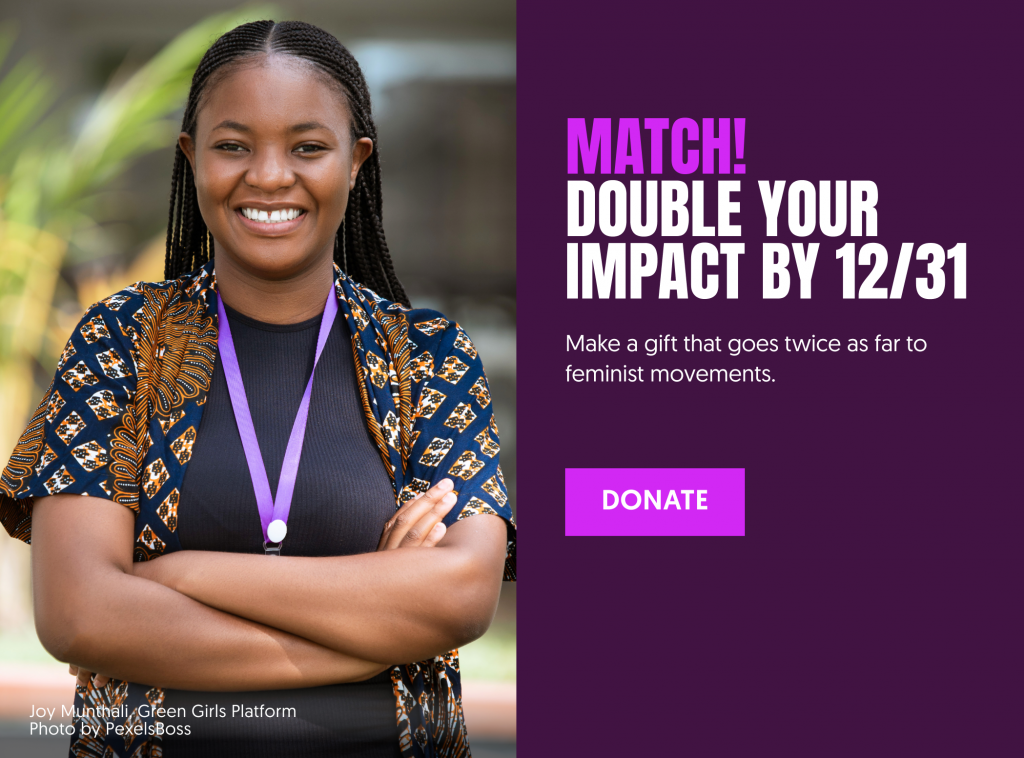Lía Zevallos

For Black History Month 2024, we interviewed Black feminist leaders from the Diaspora whose expertise includes climate justice, art that centers land and relationship, collective memory, and executive leadership. Their work—and the solidarity they build—are helping shift the power within movements for gender and racial justice while redefining what success looks like. Explore the entire campaign, and join us in lifting up the leaders and organizations across the world who center Black freedom, Black joy, and Black dignity every day.
What is your name? What organizations or movements do you work with?
My name is Lía Zevallos and I am part of Ashanti Perú, the Peruvian Network of Afro-descendant Youth. We are an organization that works for the empowerment of young people, specifically Afro-Peruvian women, around their individual and collective rights. We also support young Afro-Peruvian women to participate in social and political work to construct of a solid, sustainable citizenship that contributes to eradicate discrimination and racism here.
What are some of the key goals of your work?
The thing I'm most proud of is the work to build youth leadership to make the generational change that the Afro-Peruvian movement needs. I think it is important not only to encourage social and political participation, so that young people can exercise their rights and can also stand up against all kinds of violence, but also to show up for intersectional and collective struggles.
That has been like a solid base to be able to later broaden our vision. What is our vision for the country? What struggles do we embrace? Because if we believe that the Afro-Peruvian movement is important, for example, so is the struggle against colonialism, the anti-racist struggle, the struggle against all types of violence, the fight against discrimination, and other struggles for people with disabilities that also need to be included.
I believe that to generate political actions, social actions, it is important to build memory, isn't it? Memory can be built in a collective way to be able to raise awareness and make visible the existence of a people. For example, the Afro-Peruvian people have been made invisible and denied our history. In the national curriculum, we talk about the books that the state provides for the students of our country, we see that Afro-Peruvian history is not present. And certainly, there is only talk about the space where the Afro-Peruvian population was an enslaved population and then there was freedom and that was the end. There is no legacy, there is no history that vindicates the struggle of an entire people, of the Afro-Peruvian people for the issue of freedom, but also for the social and political contribution in the building of this country that we live in.
Because if we believe in the importance of supporting the agendas promoted by the Afro-Peruvian movement, we must also keep in mind the fight against colonialism, the anti-racist fight, the fight against discrimination, the struggles of people with disabilities and against all types of violence. We must include it in our struggles, embrace the community, embrace our demands, and unite to build a more just world.Lía ZevallosAshanti Perú, the Peruvian Network of Afro-descendant Youth
Philanthropy has historically overlooked and under-invested in Black feminism. Why is the connection between funding and shifting power needed to advance racial justice?
Feminist funding with no strings attached helps Ashanti to be able to facilitate the specific actions that we want to carry out. It helps a lot to be able to complete actions from an Afro-feminist point of view. Since we are not necessarily just a women's organization, we receive very little support to carry out projects or to develop projects that are not necessarily women's initiatives. With recent funding, we are able to hold talks, women's dialogues, and commemoration of important days.
For example, on March 8, when we commemorated Women's Day, we hosted a talk with Afro-Peruvian women, from a much more conscious point of view. We shared our own experiences, including about the violence that our bodies also survive. On July 25, which is the International Afro-descendant Women's Day, we also perform these types of events, and now we can now accomplish with this type of support. This holiday is specifically focused on a theme that is so important to us and continues to strengthen Afro-feminism here in our country.
What would success look like to you?
One success that we want to achieve as an institution is for Peru to recognize the existence of Afro-Peruvian people. I believe that the day that the Peruvian state recognizes the existence of Afro-Peruvian people in the constitution, it will be a very successful day. Because it is not only a work that Ashanti has been doing for a long time, but it is also the work of other organizations, of other collectives, of a specific movement that is going to be from these small, small steps. This can genuinely be achieved by someone at some point, either as a specific bill signed into law that is presented collectively, or by positioning the agenda from an organizational or social Afro-Peruvian movement perspective either by providing academic information; there are many ways to contribute to that.
Another example is that the demands of Afro-Peruvian youth have always been present in the participation of social and political spaces. There are already young people participating in programs such as the Youth Parliament that are generating political participation as aldermen, and as mayors of their respective communities. This is a success! Previously we thought this was a dream or very unlikely.
GET SOCIAL WITH US
Join us as we sharing Black history around the world that features the people and organizations who center Black freedom, Black joy, and Black dignity every day.
We’re most active here. Follow us to be part of timely conversations.
The best place to show your support for gender justice activists around the world.
Where we share how we see the world.

